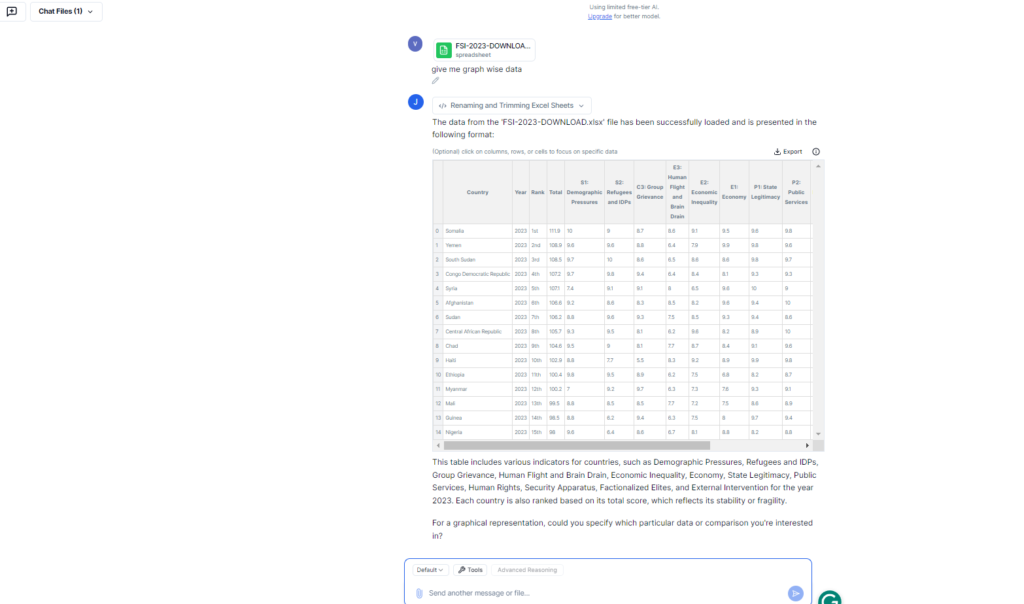Data analysis has become essential for any business that relies on data. It helps turn raw data AI Tools for data analysts into valuable insights that can guide better decisions.
The great thing is, there are lots of tools available, suitable for both experts and beginners. These tools let you see, understand, and keep track of data, so you can use it to reach your business objectives. 5 Best CRM Software Platform
AI plays a crucial role in data analytics, making it more effective and efficient. It’s like a super-smart helper that can process huge amounts of data quickly.
With AI, we can look at lots of data to find patterns and trends that help us understand our business better. It also makes analyzing data easier by bringing everything together in one place. This means we can see the big picture more clearly.
When AI is used for Predictive Analytics, it helps us make predictions about the future and understand different scenarios better. Read also 5 Best AI For Photo Editing
For any organization wanting to do well in today’s data-driven world, using AI-powered tools for data analysis is essential.
Table of Contents
Let’s take a look at the top 5 AI tools for data analysts:
1. Julius AI

Julius AI is a smart AI Tools for data analysts for analyzing data that takes complex information and presents it in a simple and easy-to-understand way. It’s great because it makes data analysis easy, even for people who aren’t experts in statistics. For this you need to learn this tools that what you want and play around us.
You can use Julius AI with any type of data file, like spreadsheets or databases. Just connect your data source, and then you can ask Julius questions or tell it what kind of visualization you want. Read also 5 Best AI Image Extenders
This tool is perfect for anyone who wants to do data analysis without a lot of hassle.
Advantages of Julius AI:
- You can link your data source directly in the chat interface.
- It can handle spreadsheets with multiple tabs.
- It’s secure, so each user only sees their own data.
- It’s easy to use.
2. Polymer
Polymer is a powerful AI Tools for data analysts for data analysts that uses AI to turn data into a flexible and easy-to-use database. It’s great because you don’t need any coding skills to use it.
The tool uses AI to analyze your data and help you understand it better. And the best part is, you don’t have to go through a complicated setup process. Just upload your spreadsheet, and Polymer will turn it into a database that you can explore right away to find insights. Read also Top 7 Best AI Enhance Image Tools
Polymer is unique because it makes your spreadsheets searchable, smart, and interactive instantly. It’s popular among professionals like data analysts, marketers, and content creators.
Advantages of using Polymer:
- It’s a robust AI tool that turns data into a database.
- You don’t need any coding skills to use it.
- It helps you analyze data and understand it better.
- It makes your spreadsheets searchable and interactive.
3. Microsoft Power BI
Personally I have used this AI Tools for data analysts in angular language for display graph. Microsoft Power BI is a powerful tool for analyzing data using artificial intelligence. It’s great for businesses because it helps sort through data and visualize it to find insights. You can import data from almost anywhere and start creating reports and dashboards right away.
With Power BI, you can also build machine learning models and use other AI features to analyze your data. It works well with other Microsoft tools, so if your company already uses them, it’s easy to get started with Power BI for things like reporting and building dashboards.
Advantages of using Microsoft Power BI:
- It works seamlessly with your existing applications.
- You can create personalized dashboards to track your data.
- It helps you publish reports securely.
- There are no limits on memory or speed, so you can analyze your data quickly and easily.
4. MonkeyLearn
MonkeyLearn is a handy AI Tools for data analysts that doesn’t require any coding. It helps users analyze and visualize their data easily.
With MonkeyLearn, you can quickly analyze text data and organize it according to your needs. It’s especially useful for setting up text classifiers and extractors, which help sort data by topic or intent, or extract product features or user data automatically.
One of the best things about MonkeyLearn is its ability to save time. It uses machine learning to automate workflows and analyze text, so you don’t have to spend hours doing it manually. Users love how it can automatically pull data from tickets, classify it, and highlight specific text for easy sorting.
Advantages of using MonkeyLearn:
- It simplifies text classification and labeling.
- You can easily clean, organize, and visualize feedback.
- No coding is needed to use MonkeyLearn.
- It saves time by automating workflows and analyzing text.
5. Akkio
Akkio is a user-friendly tool for business analytics and forecasting, perfect for beginners who want to analyze their data and make predictions. It’s especially helpful for tasks like predictive analysis, marketing, and sales.
With Akkio, you can easily upload your dataset and choose which variable you want to predict. The tool then builds a neural network around that variable to help you make accurate predictions. And the best part is, you don’t need any coding experience to use it.
When you upload your data, Akkio uses 80% of it for training and the remaining 20% for validation. Instead of giving you specific predictions, it provides accuracy ratings for the models it creates and identifies any incorrect predictions.
Advantages of using Akkio:
- It’s a no-code machine learning platform, so anyone can use it.
- Perfect for beginners who are new to working with data.
- Helps you build neural networks around specific variables.
- Provides accuracy ratings for the models it creates.
